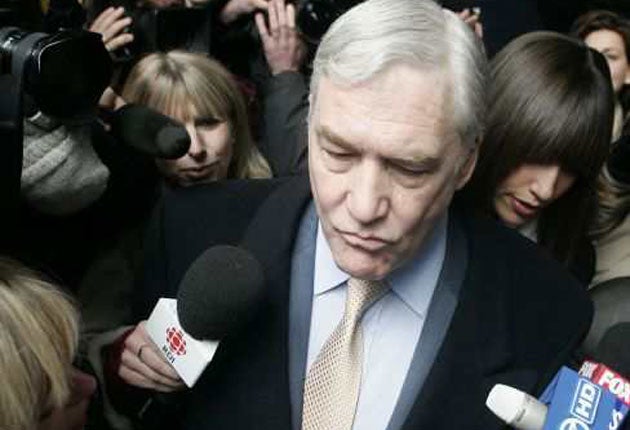Conrad Black given hope of early release

The imprisoned press baron Conrad Black has been given a sliver of hope in his long and belligerent campaign to clear his name, after the US Supreme Court ruled that the jury that convicted him of fraud were given faulty instructions.
The same ruling also re-opens the case of Jeff Skilling, the chief executive of the bankrupt energy company Enron, and is likely to make it much harder for US prosecutors to secure convictions for white collar crime and political corruption in the future.
Black, 65, was once a pillar of the Conservative establishment, the former owner of The Daily Telegraph who renounced his Canadian citizenship to become Lord Black of Crossharbour in the House of Lords, but is now serving six and a half years in a US jail. In 2007, a Chicago jury decided that he and senior colleagues illegally siphoned off $6.1m for themselves by inserting bogus clauses into deals by his Hollinger International newspaper conglomerate. The convictions had been upheld on appeal and Black also failed to get a pardon from the departing President George W Bush last year, as he had hoped.
Enron, meanwhile, has become a byword for corporate corruption, and the tale of dodgy dealing that puffed up its share price has become the subject of a West End musical. The company collapsed under the weight of its hidden debts in 2001.
Now, though, both Black and Skilling will have parts of their cases reheard by appeals court judges, raising the prospect that they could be released from jail earlier than expected. The Supreme Court ruling does not refer to all of the charges against the two men: Black was also charged with obstructing justice, after being caught on CCTV loading boxes of company documents into the back of his limo in contravention of a regulator’s order; Skilling, 56, was convicted on a total of 19 charges and is serving a 24 year sentence.
Black called the case against him “monstrous defamations” and he and his wife, Barbara Amiel, have continued to protest his innocence in newspaper columns since he went to prison.
The Supreme Court ruling hinges on a 28-word law enacted by Congress in 1988, which says corporate bosses have a duty to provide their companies with “honest services”, and that not doing so amounts to fraud. Reporting the majority verdict of the court, Justice Ruth Bader Ginsburg said that the law should only apply when executives take bribes.
"Because Skilling's misconduct entailed no bribe or kickback, he did not conspire to commit honest-services fraud under our confined construction" of the law, she wrote. The same is true of Black and his co-accused underlings, Mark Kipnis, Jack Boultbee and Peter Atkinson.
The ruling could have wide implications for securing convictions against corporate executives and politicians accused of abusing their power. The US government had argued that the “honest services” provision should be interpreted more broadly, giving them wider latitude to pursue wrongdoing.
Melanie Sloan, director of the pressure group Citizens for Responsibility and Ethics in Washington said the decision “deprives prosecutors of an important tool in their efforts to fight public corruption. Previous convictions may be vacated and corrupt officials will have an easier time escaping accountability for their misdeeds.”
Justice Ginsburg said the Supreme Court had no view on whether Black and Skilling were guilty of fraud, since the juries may have relied on other grounds for their convictions. That will be for the new appeal hearings to decide.
Skilling had also asked the Supreme Court to rule that he didn’t receive a fair trial because the huge economic harm Enron’s collapse caused in its home city of Houston had prejudiced jurors against him. The court ruled the trial was fair.
Join our commenting forum
Join thought-provoking conversations, follow other Independent readers and see their replies
Comments
Bookmark popover
Removed from bookmarks